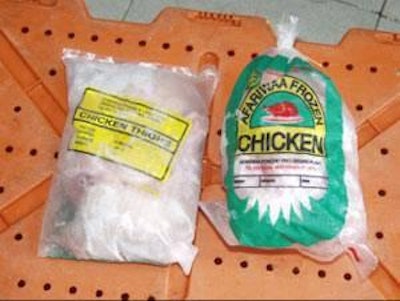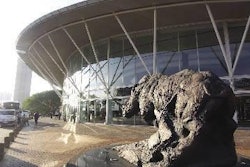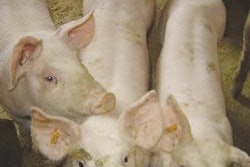
Until recently, chicken was only a seasonal meal in Ghana. Ghanaians mostly enjoyed it during festivals like Christmas and Easter, and during family celebrations. Although they managed to make some profits all year round, poultry farmers had to time their peak production schedules to coincide with these seasons to maximise sales. Ghanaians also preferred to buy live chickens and slaughter them at home. And the regular practice when visiting relatives or friends during festive occasions was to present a live chicken or two. Frozen and processed chicken were simply not available.
Changing market patterns
These days, however, things are different. Chicken has virtually become a staple dish. It is still the celebration meal of choice but now chicken is eaten all the time. At most ‘cold stores', customers tend to buy more chicken than fish or beef. Fast-food stands can be found all over the place, and between 11:00 and 23:00, you will notice workers, school children and teenagers queuing up to buy take-away fried rice and chicken, or eating at tables by the vendors.
Ghanaians attend funerals, engagements and weddings and in the past, what to serve guests was often a problem. Unlike most traditional dishes that are almost impossible to package or serve to large numbers of people or in disposable containers, fried or plain rice with chicken has provided the perfect solution.
Hotels and tourists have also helped change the demand pattern for chicken. Over one million tourists visit Ghana every year, and the previously dormant catering industry is becoming more active. Chicken is regularly on the menu.
Local producers adapting
The change in demand for chicken has, paradoxically, not been entirely to the benefit of the local poultry industry. For some time now, the Ghanaian market has witnessed an influx of cheap, frozen poultry products from Europe, South America and other parts of the world. Firms like Darko Farms and Afariwaa Farms had recorded only limited success with frozen products but with the ‘invasion' of imported products at considerably lower prices, consumers are changing. They find these products convenient to cook, and the previous preference for live, home-grown chicken is changing. Over time, the heavy patronage of foreign products resulted in a depression of the market for local chicken.
According to official estimates, local poultry production slumped to the point where it accounted for only one-third of the poultry products sold on the Ghanaian market. The local industry, represented by the Ghana Poultry Farmers' Association, called for government protection, claiming that the foreign imports were competing unfairly against them.
Support from government
Government initially responded by imposing, and then withdrawing, tariffs on imported poultry products. Later, it established a Poultry Development Board (PDB), under the chairmanship of one of Ghana's key poultry entrepreneurs, Reverend Kwabena Darko. Since its establishment, the PDB has undertaken a number of projects aimed at assisting poultry farmers to deal with the effects of competition from foreign enterprises. Ken Quartey, President of the Ghana's National Association of Poultry Farmers, has recently called on government to give legal backing to the Board, to enable it to carry out its functions effectively. Addressing the Volta Region branch of the Poultry Farmers Association, Reverend Darko asked poultry farmers to adopt the right processes to ‘stay above the bottom-line', whilst the Board and government addressed problems that were facing the industry. He asked farmers to adopt effective planning and marketing strategies that will enable them to gain sizeable market shares. He said that presently, a US company could send a refrigerated ship with well-processed poultry products to Ghana for distribution within 10 days. "You may call that dumping, but they call it planning", he said.
Local industry recovering
Although the local industry suffered significantly from the influx of foreign products, there are strong indications of a recovery. Darko Farms, Afariwaa Farms and several other major local producers are now turning out increasing volumes of processed and frozen chicken. Having experienced foreign frozen and packaged products, Ghanaian consumers are now also buying local products. Sales of locally produced frozen chicken are picking up, and poultry enterprises are enjoying the luxury of producing and marketing live and frozen products to customers year-round.
Some poultry enterprises, including several recent foreign entrances like US-based Farmer George, are introducing processing plants to take advantage of the increasing local demand, and the substantial market within West Africa. Gideon Akator, Chairman of the Volta Region Branch of the Poultry Farmers Association, says that a plant will be established to process products of member enterprises.
Market observers say that in order to benefit fully from the changing demand pattern, the local industry must improve its production methods, and do better promotion. There are already signs of improvement. In earlier days, customers trooped to farm gates and wholesale centres at Christmas and other occasions to buy fresh, live birds, and poultry enterprises did virtually no promotional work. In a collective effort aimed at reclaiming lost ground from imported products, poultry farmers started some publicity. With sustained marketing, observers say, there could be a significant improvement in the fortunes of the poultry industry.
Meanwhile, the President of the Federal Republic of Germany, Horst Kohler, has promised Ghanaian poultry farmers that with Germany's accession to European Union (EU) presidency, steps would be taken to address the unfair' export of subsidised poultry and other products to Ghana and other African countries.
On an official visit to Ghana, Mr Kohler said that unfair trade practices undermined the economies of African countries, and that the EU would introduce measures to deal with the problems. Mr Kohler's words are made more significant by the fact that he is immediate past managing director of the International Monetary Fund (IMG). During his term, he exercised substantial influence over the finances and economic performance of Ghana and other African countries whose annual budgets were substantially supported with IMF funds.



.jpg?auto=format%2Ccompress&fit=crop&h=167&q=70&w=250)











